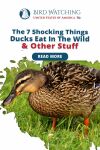
What’s This Post About?
Ducks are omnivore birds, which means they eat various foods, including both animals and plants. Ducks are grazers and will consume nearly any meal they can obtain when they exist close to people. Their diet, however, varies according to the type of duck they are and their habitats.
Naturally, a wild duck’s food is different from a pet duck which is given appropriately nutritious feed. A wild duck searches the area where it lives and eats several things that you would be shocked to find out about.
Wild ducks are non-picky eaters. Some of the shocking things they consume are mud, sand, grass, snakes, and frogs. They not only settle on whatever’s available in their location but have now also been known to take on farther than what their biological features allow, like sand crabs and small birds.

Which Wild Ducks Eat in the Wild?
Divers and dabblers are the two types of wild ducks that can be found in the wild. Mergansers, for example, will dive below the surface in search of food such as small crustaceans and plants. They may float over a region and remain underwater for several minutes at a time while feasting.
Dabblers are ducks who float on top of the water and play in the weeds and lake edges. They frequently lift their bottoms into the air to access the shallow water’s bottom, where they feed plant roots and small mud-dwelling invertebrates.
They’ll also travel onto land in search of delectable delights like berries or grains.

7 Shocking Things Ducks Eat In The Wild
Ducks are incredibly adaptable and discreet when it comes to surviving. However, when it comes to eating, they aren't fussy.
Being omnivorous animals, ducks can pretty much eat everything they find. Most people, however, assume that ducks being aquatic species eat food they see within the water bodies they reside in.
However, not all ducks live in wetlands, and many species are found in grasslands. Here are a few shocking things that ducks eat in the wild:
1. Dirt

Ducks are frequently seen pecking in the ground. As a result, it’s reasonable to believe that they enjoy the flavor of soil. They’re more interested in what’s on the inside of the ground, in any case. Ducks on dry land plunge their beaks into the earth in search of insects and small rodents.
Ducks pull the dirt out of ponds and sift it through their pectens. This way, any worms or grubs lurking in the soil will be retained. So while it may seem like they are eating dirt, they are simply looking for live things that reside within it.
2. Sand, Gravel, and Pebbles

Ducks consume the hard materials they find, like sand, pebbles, and gravel as grit. After a duckling consumes grit, it gathers in the gizzard. These tiny stones aid in the grinding of food in their gizzards and the development of healthy eggshells.
When ducklings swallow, they don’t have teeth or any other means of breaking down their meal. The gizzard is where most of the food is broken down. The gizzard cannot process hard, difficult-to-digest foodstuff without grit.
3. Grass

If there is nothing else to devour, ducks will consume a lot of grass, although this rarely happens because ducks can eat practically everything and always find something to consume. Therefore, it’s acceptable for your ducks to eat grass daily if they get enough other nutrition and meals.
WARNING!
It's important to remember that they shouldn't eat any treated grass because the chemicals and pesticides could be lethal.
4. Snakes

Ducks aren’t typically thought of as cold-blooded killers. To everyone’s disbelief, however, they have been known to eat snakes, especially dangerous snakes.
Some breeds are highly prone to eating snakes, including Muscovites, which people recommend for folks trying to keep snakes out of their gardens.
They have tendencies to pursue down tiny things because their natural diet includes rodents, lizards, and other small land creatures, in addition to duck food.
5. Sand Crabs

As any surfer or inquisitive kid knows, sand crabs are fast burrowers excellent at avoiding human touch and eager predators. Scoters (genus Melanitta) have been the only ducks known to eat them, and they’re already adapted for diving.
Shockingly, mallard ducks haven’t figured out how to surf and eat sand crabs. However, in the swash zone in Santa Barbara, California, mallards were spotted feeding. This is the first time a unique feeding approach has been documented in mallards, generally freshwater dabblers.
This tendency could be a new by-product of adaption to human-dominated ecosystems. However, throughout time, access to diverse feeding possibilities in these locations may have conditioned some Mallards to imitate shorebirds hunting in the swash zone.
Mallards, in any case, are now a member of the sandy beach food chain throughout the western coast.
6. Small Birds

The most shocking thing that you may have read until now is that these ducks now eat other small birds in the wild. According to scientists, this has never been observed previously and is most likely a new behavior.
Usually, seeds, acorns, berries, plants, and insects are among the duck’s favorite foods. However, in 2017 it was recorded that when two fledglings, a grey wagtail and a black redstart, landed in the water, they were hunted and swallowed.
The duck was having difficulty eating that wagtail, likely because it couldn’t pull it apart with its flattened bill, which isn’t designed to tear prey apart.
7. Frogs

When food is scarce, ducks will consume frogs and tadpoles. Ducks are omnivorous, and many species devour tiny frogs. Frogs and toads are known to be lower on the food web than ducks and geese.
DID YOU KNOW?
Frog-hunting talents are particularly well-known among mallard ducks.
Ducks cannot eat most frogs without choking since they are relatively huge. As a result, they prefer naturally smaller tadpoles.
It also makes it easier for the ducks to grab the tadpoles, who like to reside near the water’s surface. As a result, they don’t have to look for tadpoles, one of the most common problems with frog hunts.
Shocking Things You Can Feed Ducks

To further amaze you, let’s now go over uncommon things that wild ducks eat and enjoy. Although it is paradoxical to offer eggs to ducks that laid the eggs, they want scrambled eggs. Furthermore, scrambled eggs are a great source of protein, which ducks require for a well-balanced diet.
Eggshells are a fantastic food for ducks, in addition to scrambled eggs, because they provide a high protein diet and calcium. Simply break the eggshells and add them to the duck diet.
PRO-TIP
Remember to feed the duck in small quantities of small-sized food. They can easily choke.
What Should You Not Feed Wild Ducks?

Interestingly even though ducks eat practically anything, there are a few things that you should never feed ducks. Because ducks are not very fussy when it comes to food and will consume whatever you put out, food like bread, spinach, avocados can be proven harmful for the bird.
Citrus Fruits
Citrus fruits like lemons, limes, oranges, and grapefruit are the only fruits ducks should avoid. Citrus fruits have been shown to promote acid reflux and interfere with nutrient absorption in ducks. As a result, they lay eggs with fragile shells. You should also avoid spinach for similar reasons.
Fruits With Pits
Avocados are also poisonous to ducks, so don’t feed them any. If you’re feeding your ducks fruits with pits, attempt to remove the pit before to prevent them from choking because stone fruit pits carry minute quantities of cyanide, which can harm the ducks.
Iceberg
Ducks eat peas, cucumbers, sweet potatoes, kale, lettuce, and other veggies. But if you do decide to offer them lettuce, ensure it’s not iceberg lettuce, which has no nourishment for ducks. In fact, ducks can even get diarrhea from eating iceberg lettuce.
Salty Food
Ducks gain weight quickly, and crackers or other salty, sugary, or fatty foods are harmful to them. In addition, their legs become strained as a result of the extra weight. Salt poisoning is also a common cause of death in ducks.

Keep Reading!
What ducks eat in the wild can genuinely amaze you. Their conventional diet consists of worms, insects, plants, fruits, vegetables, and fish. However, most people do not know that they also eat pebbles and sand that help them break down the food they consume.
Other shocking things include snakes, crabs, small birds, and even grass. While you may be under the impression that ducks eat anything, there are a few things they should steer clear of. These include citrus fruits, avocados, icebergs, and even bread.
Now that you know what ducks eat in the wild, read about what you can feed ducks yourself!
7 Healthy Things to Feed Ducks And 6 Very Bad Things
Ducks are medium-sized birds that love to eat. To distinguish between healthy and bad food sources that can be fed to ducks, read below.

By David A. Swanson
Bird Watching USA
My name is David and I'm the the founder of Bird Watching USA! I started Bird Watching with My father-in-law many years ago, and I've become an addict to watching these beautiful creatures. I've learnt so much over about bird watching over the years that I want to share with the world everything I know about them!

David A. Swanson
Bird Watching USA
My name is David and I'm the the founder of Bird Watching USA! I started Bird Watching with My father-in-law many years ago, and I've become an addict to watching these beautiful creatures. I've learnt so much over about bird watching over the years that I want to share with the world everything I know about them!



